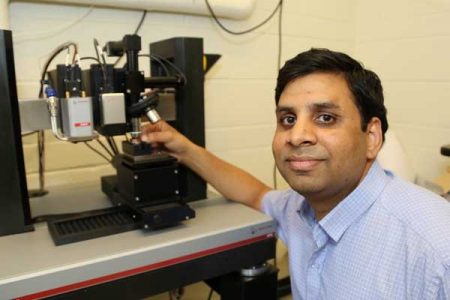
Professor Chandra Veer Singh and his team design materials at the nanometre scale. Examples include strong yet lightweight materials that could reduce weight and improve fuel efficiency in automobiles and aircraft, and catalytic materials which facilitate chemical reactions to convert CO2 into useful chemical fuels, such as methanol, using sunlight. (Photo: Tyler Irving)
October 4, 2016
Materials Science & Engineering (MSE) Professor Chandra Veer Singh has been awarded an Early Researcher Award and the inaugural Erwin Edward Hart Professorship for his excellence in research at U of T Engineering.
The Early Researcher Awards (ERA) from the Ontario Ministry of Research, Innovation and Science provide support that helps promising scientists and engineers in the first five years of their academic careers build their research teams. The ERAs fund innovation and support world-class studies and research talent across Ontario. Professor Singh was one of six U of T Engineering professors to receive this prestigious award.
The Percy Edward Hart and Erwin Edward Hart Professorships were created by a landmark bequest from the estate of alumnus Erwin Edward Hart (CivE 4T0). The Professorships are awarded to seven professors across the Faculty of Applied Science & Engineering to enhance emerging research and education. The seven professors are all within the first 10 years of their careers and have demonstrated a high level of research excellence and exemplary graduate student mentorship.
“These awards are well deserved,” says MSE Department Chair Jun Nogami. “Chandra has not only built a strong research program, but as a computational materials engineer, he has established collaborations with many faculty both within and outside our department.”
Professor Singh received his PhD in Aerospace Engineering from Texas A&M University and conducted postdoctoral research at Cornell University before joining U of T Engineering in 2011. He specializes in designing new materials using computer models and simulations that optimize weight, catalytic activity or other properties. Such materials could lower costs and reduce emissions from the transportation industry by enabling aircraft and other vehicle to be made from strong yet lightweight components. They could also advance sustainability by catalysing the production of hydrogen for fuel, or the conversion of CO2 into useful chemical fuels such as methanol using sunlight. In 2015, Professor Singh was part of the U of T Solar Fuels team that won the Connaught Global Challenge Award.
“It is an honour and privilege to receive these awards as an early recognition of the excellent scientific contribution made by the students and postdocs in my group,” said Chandra Veer Singh. “These grants will help us gain new insights in engineering novel materials for sustainable energy and transportation; and train young materials engineers for the Canadian industry.”
—With files from Tyler Irving, Engineering Strategic Communications